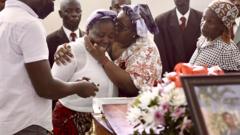The recent killing of young protesters, including 16-year-old Antonio Juaqim, during opposition-led demonstrations in Mozambique has sparked outrage and sorrow amid a tense political backdrop following a contested election. The situation raises urgent questions about the future direction of the country as youth demand change from the long-standing ruling party.
Tragic Deaths of Young Protesters Highlight Political Turmoil in Mozambique

Tragic Deaths of Young Protesters Highlight Political Turmoil in Mozambique
The deaths of children during protests against election results underline the escalating violence in Mozambique, as calls for change clash with government authority.
The mourners at a cemetery in Maputo, Mozambique, were predominantly children mourning the loss of their friend, 16-year-old Antonio Juaqim, shot dead while participating in pot-banging protests against last month's presidential election results. His uncle, Manuel Samuel, recounted, "Antonio was shot in the mouth, and the bullet went through the back of his head," highlighting the brutal reality of the police response to dissent.
Antonio's death serves as a grim reminder of the fragile political state in Mozambique since the ruling Frelimo party was declared the winner of the recent elections. The electoral commission reported a contentious victory for Frelimo’s candidate, Daniel Chapo, who received 71% of the vote, while rival Venâncio Mondlane claimed a rigged election and subsequently fled the country fearing arrest. Mondlane has since mobilized his supporters to protest against the election via social media, urging them to bang pots and pans nightly at 21:00 as a means of resistance.
Initially, on November 15, when the protests began, many took to the streets filled with hope for change. However, the demonstration turned deadly, with Antonio among the casualties. Following his funeral at the São Francisco Xavier Cemetery, friends recalled his vibrancy, starkly contrasting with the tragic proof of political violence unfolding around them. "At the morgue, I counted six bodies of young children," mourned Mr. Samuel, emphasizing the lasting impact of these deaths on their shared future.
According to human rights organizations, police violence has led to the deaths of approximately 40 individuals since the protests began, including at least ten children. While Mozambique police commander Bernadino Raphael expressed sympathy for the families, he claimed the children were used as shields by protesters, further intensifying tensions.
Domestic and international observers agree that Mozambique has entered a perilous phase; the state's heavy-handed response to protestors reveals a significant shift from the historical tolerance afforded by the government. Politician Albino Forquilha condemned the excessive police force employed against peaceful demonstrators, fearing a loss of public trust towards the government.
Analysts note that for the first time, such a high number of casualties has occurred during protests, indicating a drop in Frelimo’s popularity, especially among the youth who desire economic opportunity and financial independence. The pervasive sentiment among the younger generation is clear — they seek not only political change but also a better future.
As the political climate unravels, Daniel Chapo's government maintains a low profile, awaiting judicial decisions on Mondlane's challenge to the election outcome. With ongoing vigils and mourning activities organized by Mondlane's adherents, Mozambique appears to be standing at a crossroads, questioning the path toward possible justice and national healing amid one of its gravest crises in decades.

















